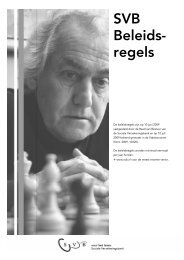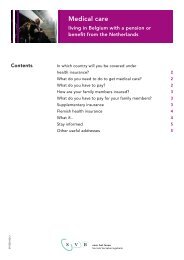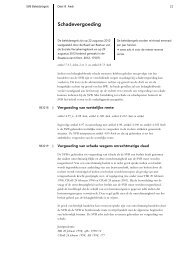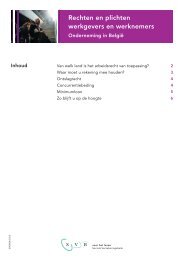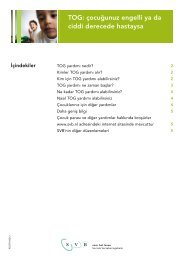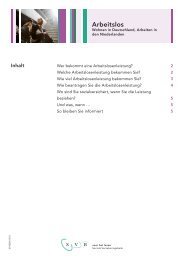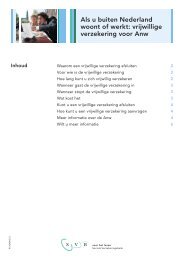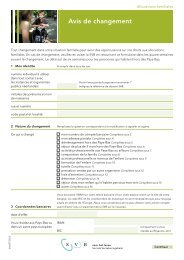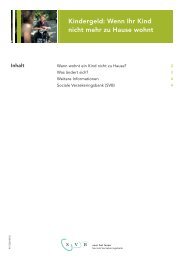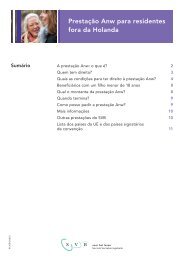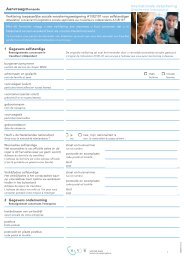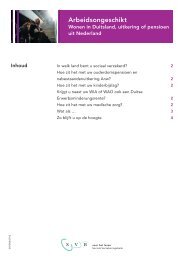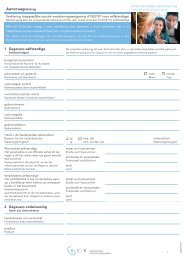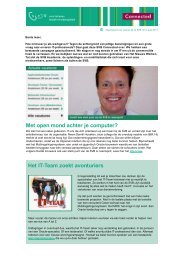September 2010 (pdf, 1,42 MB) - Svb
September 2010 (pdf, 1,42 MB) - Svb
September 2010 (pdf, 1,42 MB) - Svb
You also want an ePaper? Increase the reach of your titles
YUMPU automatically turns print PDFs into web optimized ePapers that Google loves.
AANSPRAAK<br />
SEPTE<strong>MB</strong>ER <strong>2010</strong><br />
Selected articles in English translation<br />
© Pensioen- en Uitkeringsraad - Aanspraak, <strong>September</strong> <strong>2010</strong> 1
Contents<br />
The page numbers refer to the original Dutch edition<br />
Page 3<br />
Mag ik u even aanspreken?<br />
Speaking for your benefit<br />
Page 4-7<br />
‘Dankzij mijn dappere moeder heb ik Tjideng overleefd’<br />
Hermance Clegg, moeder van de Britse vice-premier Nick Clegg, zat als kind in het<br />
jappenkamp Tjideng<br />
‘I survived Tjideng thanks to my mother’s courage’<br />
Hermance Clegg, mother of the British Deputy Prime Minister Nick Clegg, was a<br />
survivor of the Japanese camp Tjideng<br />
Page 22<br />
Vraag & antwoord<br />
Question & Answer<br />
The information on page 8-9 and page 19 has not been made<br />
available in English because the text refers to regulations which<br />
apply to those living in the Netherlands only.<br />
No rights may be derived from this text.<br />
Translation: SVB, Amstelveen.<br />
© Pensioen- en Uitkeringsraad - Aanspraak, <strong>September</strong> <strong>2010</strong> 2
Page 3<br />
Mag ik u even aanspreken?<br />
Speaking for your benefit<br />
While I was walking through the woods near the northern Dutch town of Bakkeveen<br />
recently, I came across a war monument marking the spot where ten Dutch men had<br />
been shot by the German occupying forces in the early morning of 10 April 1945,<br />
less than a month before the liberation of the Netherlands. The execution was<br />
probably in retaliation for anti-German activity, although the exact circumstances are<br />
still unknown. One of the men was a local artist, Hendrik Werkman, a celebrated<br />
member of the art movement known as De Ploeg (The Plough), who had also worked<br />
for the resistance as a printer.<br />
The tangible remains of the Second World War throughout the Dutch countryside<br />
form part of the legacy that links us to that dark period in our history. Sometimes we<br />
actively seek out that link, when we attend a commemoration service, for example.<br />
But we may also run into it accidentally, as I did on my Sunday afternoon stroll<br />
through the woods and heaths near Bakkeveen. Standing in front of these quiet<br />
monuments, one is struck by the horror they represent, heightened by the seemingly<br />
unbroken peace of the surrounding countryside.<br />
In recent years, the Dutch government has invested seriously in a project designed to<br />
protect the legacy of the war. This project has been discussed in earlier issues of<br />
Aanspraak and its importance cannot be overstated. While offering those who lived<br />
through the war the chance to revisit the world they lost, it provides future<br />
generations with the historical perspective we all need to give meaning to our lives<br />
and direction to the society we live in. The project’s closing conference will be held<br />
this month, and on some lovely Sunday afternoon, you may just encounter its traces.<br />
Ronald Leopold<br />
General secretary / Director<br />
© Pensioen- en Uitkeringsraad - Aanspraak, <strong>September</strong> <strong>2010</strong> 3
Page 4-7<br />
‘Dankzij mijn dappere moeder heb ik Tjideng overleefd’<br />
Hermance Clegg, moeder van de Britse vice-premier Nick Clegg, zat als kind in het<br />
jappenkamp Tjideng<br />
‘I survived Tjideng thanks to my mother’s courage’<br />
Hermance Clegg, mother of the British Deputy Prime Minister Nick Clegg,<br />
was a survivor of the Japanese camp Tjideng<br />
The mother of the British Deputy Prime Minister Nick Clegg is Dutch. During the<br />
Second World War, she was held in the Japanese camp Tjideng, along with her<br />
mother and sisters. As the recently-elected party leader of the Liberal Democrats, her<br />
son Nick found himself in the spotlight of international media attention during the<br />
British parliamentary elections in May <strong>2010</strong>.<br />
In several media interviews, he was asked about the time his mother had spent in the<br />
Japanese camps. What did the Dutch Hermance Clegg-van den Wall Bake think of her<br />
son’s sudden fame? And how was she able to tell her children about her time in the<br />
camps?<br />
Could you tell us something about your background?<br />
‘My mother studied English in Amsterdam and met my father on a student boat trip.<br />
They got married at the beginning of 1932. After my father finished his studies at the<br />
Technical University in Delft, he went to the Dutch East Indies to work for the<br />
Batavian Oil Company, and my mother followed. In the years before the war, they<br />
were very happy. They had three daughters; I was the middle one. I was born on 23<br />
November 1936 in Palembang. Although my parents were not religious, I later turned<br />
to Catholicism. I liked to pray, even as a child.’<br />
How old were you at the start of the Second World War?<br />
‘I think I was five when the air raid sirens began, and we were living in Surabaya. My<br />
mother gave us a piece of rubber to put between our teeth, a saucepan on our heads<br />
and cotton wool in our ears. We had to go into a bunker that heavy rain had turned<br />
into a huge puddle of mud. In December 1941, after Pearl Harbor, my father was<br />
made first reserve lieutenant in the cavalry. The whole family moved to a garrison on<br />
West Java called Batujajar.<br />
In 19<strong>42</strong> my father was called up to defend the country. I missed him terribly. After<br />
the capitulation, he was held in the Glodok prison in Batavia. To be near him, the rest<br />
of us moved in with a friend of my mother’s, Julie Feith. My mother was a strong<br />
personality and we children always felt safe with her. She cooked large pans of food<br />
for my father and the other men in prison. On the bottom of the cooking pans she<br />
wrote messages for my father, stuck plasters over them, and took them to the prison<br />
on her bicycle. But Sukarno had his eye on the Feith’s beautiful family home, and<br />
when he confiscated it in October 19<strong>42</strong>, one of the Japanese soldier’s kicked my<br />
© Pensioen- en Uitkeringsraad - Aanspraak, <strong>September</strong> <strong>2010</strong> 4
mother so hard that she developed a tropical ulcer on her shin. Aunt Julie was hit by<br />
Sukarno himself. My mother thought it would be better for our own safety if we<br />
moved to Kramat, a Japanese detainment camp. At first Kramat was an open camp<br />
and we were free to come and go. The women in the camp were always fighting over<br />
food, but my mother avoided getting involved. She would say: “Here, take mine!”,<br />
even though it meant we got hungrier.’<br />
What memories do you have of the war?<br />
‘Every day I saw a man walk his dog, a wonderful German Shepherd. Then, one day,<br />
we were told that dogs were no longer allowed in Kramat and I saw the Japanese put<br />
the dog in a wooden box and hammer nails right through it. That really shocked me.<br />
Around that time, I had to go into hospital to have my appendix removed. While I was<br />
away, they closed off the camp with a fence of plaited bamboo, so that no one could<br />
visit me for three weeks, which felt like a terribly long time. Also, in Kramat, my<br />
mother and three children were crammed in one house with aunt Julie Feith and her<br />
five children.<br />
On 23 August 1943, 2,500 women and children were forced to leave camp Kramat<br />
for Tjideng, another camp in Batavia. We were transported by carrier cycle. In<br />
Tjideng, there were seventeen of us in one house. My mother and sisters and I all had<br />
to sleep in one bed, with nine people to a room. We were constantly plagued by<br />
bedbugs, impossible to get rid of. Every day, our ball rolled into the open sewer at the<br />
side of the road. My mother kept repeating that we had to wash our hands. It is a<br />
wonder that we managed to get out of it alive. At first there were 2,500 people in<br />
Tjideng but we had to keep making room for a steady stream of new prisoners. By<br />
the end of the war there were 14,350 women and children in the camp. Although<br />
there was a lot of petty theft in the camp, there was also a feeling of solidarity. If one<br />
of the mothers got ill, someone would step in and take care of the children.’<br />
What gave you the courage to go on?<br />
My mother gave us hope. She would always say: “You have to learn to read and<br />
write. If you go to school in Holland in the future, you will want to be in the right age<br />
group.” She kept up our spirits, she was a real heroine. She gave me a dictionary she<br />
had made for my birthday. She read ‘Alice in Wonderland’ in English with my sister.<br />
Because she did not know enough about mathematics, she paid for my elder sister’s<br />
math lessons with baked sago starch, even if it meant the four of us went hungry.<br />
That shows how much she believed we would eventually live a normal life in Holland.<br />
When the war ended, she only weighed 36 kilos.<br />
There were lots of times when the women panicked and some of them started to beat<br />
their children. The camp commandant, Sonei, was a cruel lunatic who made us stand<br />
on parade for hours on end, day and night, so we could be counted. We had to make<br />
a very deep bow, in the direction of Japan, with our little fingers on the side seams of<br />
our skirt. If we did not do it properly, we were beaten. The Japanese would lose<br />
count and were forever having to start again, but my mother always stayed very<br />
calm.’<br />
© Pensioen- en Uitkeringsraad - Aanspraak, <strong>September</strong> <strong>2010</strong> 5
What was your worst fear?<br />
‘During the whole time we spent in the camps, my mother managed to keep hold of<br />
her photograph albums. She had also salvaged some silver that she kept hidden in my<br />
bag under a pile of cloths. One day, my bag jingled accidentally during roll-call. I was<br />
terrified that I would be caught. A Japanese soldier searched through the cloths, and<br />
then, to my great relief, he clapped his hands and I could move on.<br />
Our worst fear was that we would lose each other, so my sisters and I were very<br />
worried about my mother’s tropical ulcers. She was covered with them because of a<br />
vitamin C deficiency. For her sake, we would go out early in the mornings and gather<br />
cherries that had fallen from the trees in the night.<br />
One time when she was picked up by the guards after an air raid warning, we howled<br />
with anguish. There was also a rumor that women and children were to be separated,<br />
which gave me nightmares. But before they could carry out that plan, the atom bomb<br />
was dropped and the war ended. Later, my mother would often say to me: “If it had<br />
lasted one more month, you wouldn’t be here.” I was listless by that time and unable<br />
to eat anything at all.’<br />
How did it feel to be liberated?<br />
‘After the bomb on Hiroshima, we noticed the Japanese were starting to pull back.<br />
The first feeling of liberation came when we heard my father was coming back. We<br />
waited for him by the gate, full of excitement. I recognized him immediately from the<br />
photograph my mother always had with her but, to protect us, the guard would not<br />
let anyone in. My father shouted: “Either you open the gate or I’ll drive straight<br />
through it!” He was the first Dutch man to arrive in the camp. I was terribly<br />
disappointed when he did not recognize me but embraced another girl instead. It took<br />
me a while to get used to his deep voice. My mother was overjoyed; many women<br />
heard that their husbands had not survived. My father took us to a house owned by<br />
the Batavian Oil Company, but we had to return to the camp after a few days for our<br />
own safety.’<br />
What do you remember of the Bersiap period?<br />
‘After Tjideng we ended up in the Tjihapit camp for families in Bandung, mainly for<br />
our own safety, and I attended school there. My sister and I witnessed a murder in<br />
the square in front of the school. A group of natives was just standing around when<br />
we suddenly saw a man collapse in a pool of blood. We were shocked. It was an<br />
extremely dangerous time. The freedom fighters had started going after the Dutch<br />
inhabitants and our house was next to the bamboo fence. To protect us, my father<br />
sat next to the gap in the fence with an axe in his hand. During a train journey from<br />
Batavia to Bandung, we were attacked by freedom fighters when we entered a<br />
tunnel. It got harder and harder to breathe as everyone fled down to our end of the<br />
train. We heard shots and women and children screaming. My mother said calmly:<br />
“Stay very still and you won’t need so much air.” My parents realized then that we<br />
had to leave the country.’<br />
How did you get to the Netherlands?<br />
‘We managed to get onto one of the first flights via Cairo to the Netherlands. When<br />
we arrived in Cairo, sick and weak, the Red Cross looked after us and gave us our<br />
© Pensioen- en Uitkeringsraad - Aanspraak, <strong>September</strong> <strong>2010</strong> 6
first real food. We were advised to chew each mouthful 36 times. For the first few<br />
years after the camp I suffered from anemia and inexplicable fevers and could not<br />
keep up with other children my age.<br />
Later, I trained as a remedial teacher and have always taught dyslexic children. I met<br />
my husband, Nick Clegg senior, in Cambridge while on an English course. It was love<br />
at first sight. I emigrated to England and we had three sons and a daughter. Last year<br />
we celebrated our fiftieth wedding anniversary with a big family party in Holland.’<br />
Have you ever been back?<br />
‘Two years ago, I took a trip to Indonesia with my youngest son, Alexander. I showed<br />
him where I had been interned in Tjideng. Amazingly enough, I remembered the way<br />
exactly. When I went back there for the first time with my husband, 10 years ago, I<br />
did not expect to experience any camp syndrome. But in fact I found myself<br />
overwhelmed by emotion. I stood nailed to the ground with fright as it all came<br />
flooding back. I realized how difficult it must have been for my mother with three<br />
small daughters to keep her courage up for three and a half years.’<br />
What are the most important life lessons you learned from what you went through?<br />
‘My mother was an exceptionally strong person with an enormously positive<br />
character. She never wanted to dwell on people’s weaknesses. She preferred to<br />
ignore the bad side, which is what she did in the camp. My father taught me not to<br />
harbor prejudice against any race whatsoever because all are guilty of having<br />
committed some atrocity in the past. He did not want to pass anti-German or anti-<br />
Japanese feelings on to his children, and neither did I, as nothing would be gained by<br />
it.’<br />
So what would you like to pass on?<br />
‘I am very conscious of the time I lost in the camp. One’s youth is such a precious<br />
time. I wanted my children to really have fun and it is very important to me that we<br />
get on well as a family. It makes you realize that all life hangs by a thread. You try to<br />
protect your children from the bad things. Later, I could not help thinking: ‘Why did<br />
they have to be so cruel?’ I still do not know the answer. In the end it all comes<br />
down to the difference between good and evil. That is why I became a Catholic. I<br />
believe that Mary, the mother of Jesus, can help heal a broken world.<br />
It is still difficult for me to talk about the war. I want to guard against passing on the<br />
fear. Language can also be a barrier to understanding, for example, the English word<br />
‘camp’ is associated with going camping. My children would sometimes say “Mum,<br />
when you were in those tents…”. Words can hardly explain what I went through.<br />
Before this interview, I said to my son Alexander: “They want to know how my time<br />
in the camp affected your upbringing.” To which Alexander replied: “We learned<br />
never to make a fuss about food.”<br />
We are proud of all our children, and that includes Nick. We did our best to give them<br />
an international upbringing and encouraged them to go on exchanges to other<br />
countries as part of their studies. We wanted them to see that there are many<br />
different ways of approaching a problem.<br />
© Pensioen- en Uitkeringsraad - Aanspraak, <strong>September</strong> <strong>2010</strong> 7
Nick grew up amazingly quickly and was always an oasis of calm in the family. In one<br />
of his primary school reports they said he took on too much for his age, but it was his<br />
own choice. He has always been incensed by injustice and he will definitely have his<br />
work cut out for him in British politics. But we support him and advise him if we can.<br />
As his mother, of course, I would prefer to see him get more rest. With a full political<br />
agenda, there is hardly any chance of sleep.’<br />
Interview: Ellen Lock<br />
© Pensioen- en Uitkeringsraad - Aanspraak, <strong>September</strong> <strong>2010</strong> 8
Page 22<br />
Vraag & antwoord<br />
Question and Answer<br />
My Wubo benefit claim was rejected because there was no way of verifying my story.<br />
After a long search I have now found someone who witnessed what I went through.<br />
Does this mean that I can submit a new claim?<br />
If there are no witness statements or historical source material to prove that you were<br />
directly affected by the war, we cannot recognize you as being a civilian war victim<br />
and we are obliged to reject your claim for a Wubo benefit. In that case, you are not<br />
required to undergo any medical assessments. This does not mean that we do not<br />
believe your story, but that we have not succeeded in finding supporting evidence<br />
that you were directly affected by the war as stipulated in the Benefit Act. If, at a<br />
later date, you find someone who witnessed what you went through first hand and<br />
who can confirm your story, you can submit a new claim. We will then check<br />
whether our earlier decision needs to be revised.<br />
I currently receive a reimbursement for my personal contribution to my home help, but<br />
I am not happy with the help I am getting. If I switch to a private home help for half a<br />
day a week, will this affect my reimbursement?<br />
If you switch from a home help provided through the Dutch Home Care organization<br />
to a private home help, you have to send us a letter with the date your last home help<br />
stopped. We will then convert the reimbursement you get for your personal<br />
contribution into a reimbursement for a period of half a day.<br />
I live in the States and recent changes in the exchange rate have reduced the amount<br />
of Wuv benefit I receive in dollars. Can my benefit be increased to compensate for<br />
this?<br />
Your benefit is awarded in euros and paid in euros. The amount you finally receive<br />
depends on the exchange rate between the euro and, in your case, the American<br />
dollar. There is no provision in law that allows us to revise the amount of your benefit<br />
to take account of fluctuating exchange rates. In fact, revision of your benefit is only<br />
possible if there is a major change in your domestic circumstances or your sources of<br />
income.<br />
In past years, I sometimes received a payment of arrears of benefit after the definitive<br />
calculation had been made. So far this year, I have not heard anything, and was<br />
wondering whether I might still get an arrears payment.<br />
In the past, you will have received an arrears payment of pension or benefit if the<br />
provisional amount calculated turned out to be too low. The arrears represented the<br />
amount that you were entitled to, but that you had not yet received. The definitive<br />
assessment of your pension or benefit was based on your income details for the year<br />
concerned and other relevant details on the annual information form. As from<br />
1 January 2009, however, the calculation of pensions and benefits has been<br />
simplified, and you are no longer required to submit your income details annually.<br />
© Pensioen- en Uitkeringsraad - Aanspraak, <strong>September</strong> <strong>2010</strong> 9
Since that date, your benefit is index-linked, based on the amount you received in<br />
December 2008 and updated every six months so that you always know exactly how<br />
much you are getting. Arrears or advance payments are still possible, but only if your<br />
benefit has to be revised because of changes in your domestic situation.<br />
© Pensioen- en Uitkeringsraad - Aanspraak, <strong>September</strong> <strong>2010</strong> 10



